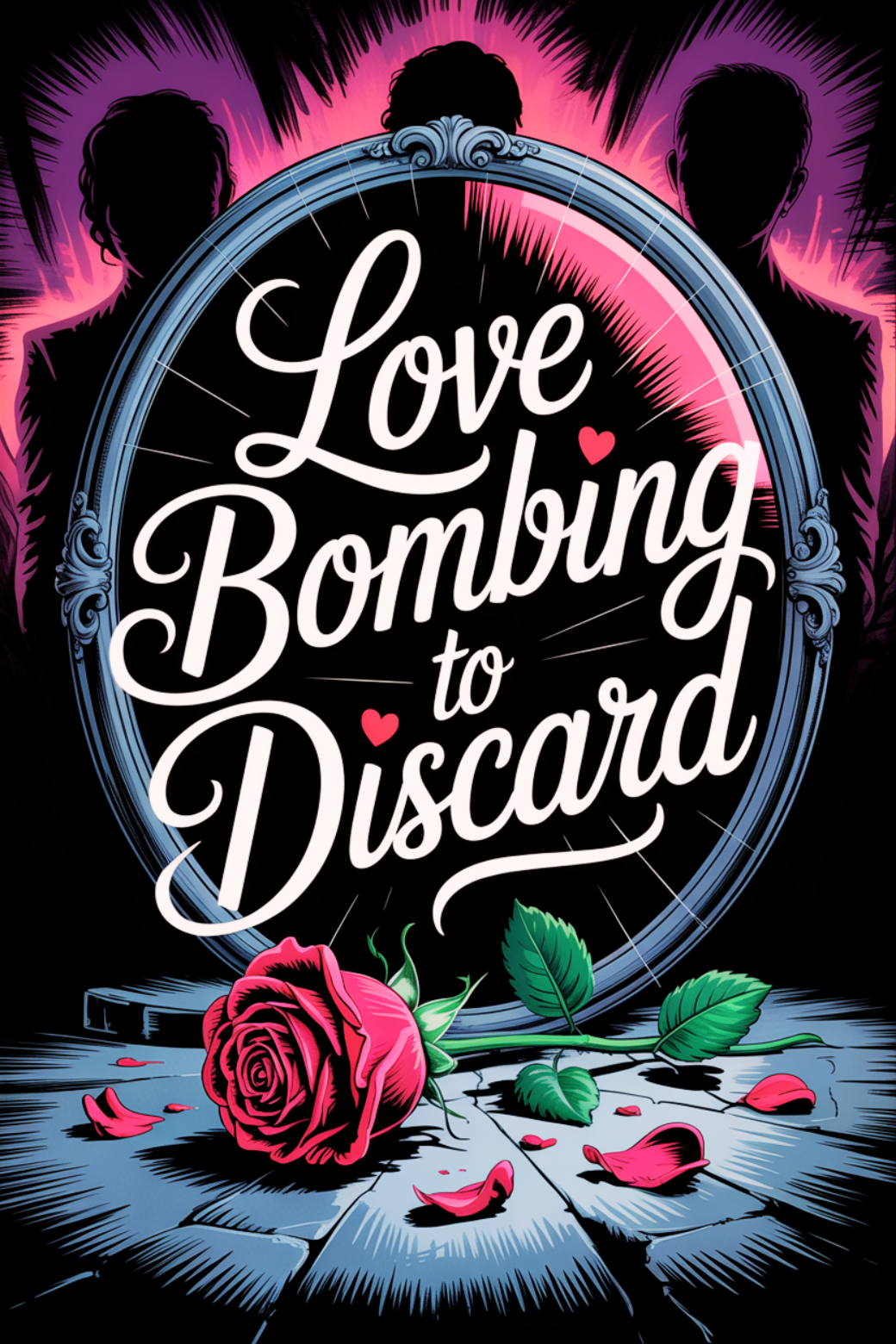Now Reading: Love Bombing to Discard: The Narcissist’s Relationship Cycle Explained
- 01
Love Bombing to Discard: The Narcissist’s Relationship Cycle Explained

Love Bombing to Discard: The Narcissist’s Relationship Cycle Explained
Ever Been Swept Off Your Feet, Only to Be Suddenly Dropped with No Warning?
One minute, they’re showering you with lavish attention, grand promises, and constant affection. The next, they vanish, leaving you confused, devastated, and blaming yourself.
- “Were they ever who they claimed to be?”
- “How can someone go from worshipping me to discarding me so fast?”
- “Am I the problem—or is this some twisted cycle?”
Welcome to the narcissist’s relationship cycle—it starts with love bombing and ends with a cold discard, leaving you traumatized and questioning your reality.
In this article, you’ll discover:
- What love bombing really is and why narcissists use it.
- The stages of the narcissist’s relationship cycle—from euphoric idealization to brutal discard.
- Why you keep falling for it, despite the red flags.
- How to apply the IMC Method™ to protect yourself and break free.
1. What Is Love Bombing?
Love bombing is an overwhelming show of affection, attention, and “perfect” compatibility—all orchestrated to hook you fast. It’s not genuine love; it’s a manipulative tactic often used by narcissists to create an intense emotional bond quickly, making you dependent on their approval.
Key Traits of Love Bombing
- Excessive Compliments: “You’re my soulmate,” “I’ve never felt like this before.”
- Grand Gestures: Surprise gifts, elaborate dates, or public declarations of love.
- Fast-Forward Intimacy: Talking about marriage, kids, or living together shockingly early.
- Immediate Connection: They claim to “get” you like no one else ever has, mirroring your interests.
Bottom Line: Love bombing is calculated to make you feel special and helplessly addicted to the narcissist’s attention.
2. The Narcissist’s 5-Stage Relationship Cycle
Narcissistic relationships often follow a predictable cycle—love bombing is only the beginning.
Stage 1: Idealization (Love Bombing)
- They shower you with affection, admiration, and gifts.
- You feel euphoric, convinced you’ve found “the one.”
Stage 2: Devaluation
- Subtle criticisms or put-downs creep in.
- You sense tension, but you can’t quite pinpoint why.
- You start walking on eggshells—eager to keep things “perfect” like before.
Stage 3: Gaslighting & Control
- They rewrite reality—denying things they said, blaming you for problems.
- You doubt your memory and rely on them to define what’s “true.”
Stage 4: Discard
- They abruptly detach—sometimes ghosting, sometimes blaming you for “ruining everything.”
- You’re left confused and broken, often desperate for closure.
Stage 5: Hoovering (Sometimes)
- They return with apologies, fake remorse, or grand gestures, pulling you back in—and the cycle repeats.
Note: Some narcissists skip or shorten certain stages depending on how much supply they need from you.
3. Why We Fall for It: The Psychology Behind the Hook
Love bombing isn’t just flattery—it’s a psychologically potent tool that hijacks your emotional responses.
A. Intermittent Reinforcement
- Brief Moments of Euphoria: The early love-bomb stage provides a flood of dopamine (the “pleasure” hormone).
- Later, They Withdraw: You crave that initial high, so you work harder to “win back” their affection.
B. Cognitive Dissonance
- Contradictory Realities: “They were so loving—maybe I’m at fault for the change.”
- You Dismiss Red Flags to resolve the mental tension—clinging to the fantasy they created.
C. Fear of Abandonment
- Human Need: We’re wired to avoid rejection or isolation.
- Narcissist’s Leverage: They exploit this fear to keep you chasing their approval.
Statistic: A study in the Journal of Interpersonal Violence (2020) found that over 70% of narcissistic abuse victims describe “love bombing” as the most disorienting part of the relationship—creating a powerful emotional dependency.
4. Common Signs & Patterns
- Too Much, Too Soon
- They speak of soulmates or true love within days or weeks.
- Excessive Flattery or Gifts
- Seemingly generous, but it comes with unspoken expectations.
- Fast-Paced Relationship
- Pushing for commitment, intimacy, or life plans at lightning speed.
- Sudden Shift
- The moment you disagree or set a boundary, the loving persona cracks.
- You Feel Guilty for Questioning Them
- They label you “ungrateful”, “untrusting,” or “paranoid” if you raise concerns.
5. Real-Life Examples
A. Romantic Partner
- Scenario: They plan a fairy-tale proposal after one month, insisting you’re “meant to be.” Any hesitation triggers guilt trips about your lack of trust.
- Effect: You rush into engagement, ignoring glaring red flags because it all feels so magical.
B. Family Member
- Scenario: A sibling or parent lavishes you with compliments or financial support, then disowns you for minor disagreements.
- Effect: You walk on eggshells, desperate to maintain the “good graces” you once had.
C. Boss/Manager
- Scenario: A new boss praises you as the “best hire ever,” boasting how you’ll transform the company, then criticizes every minor error.
- Effect: You feel unsteady—constantly trying to replicate the initial praise.
D. Co-worker
- Scenario: They befriend you instantly, texting you outside work about personal things, then turn on you abruptly if you don’t align with their ideas.
- Effect: You question your professional boundaries and self-worth.
6. Emotional & Psychological Toll
- Elevated Cortisol: The stress of managing their shifting behavior leads to anxiety, insomnia, and burnout (Mayo Clinic, 2020).
- Cognitive Dissonance: You second-guess your intuition, believing their version of reality.
- Isolation & Self-Blame: They may turn friends and family against you or make you feel you’re the problem.
Result: This cycle leaves you exhausted, confused, and unable to leave—because a part of you still craves the initial love-bomb high.
7. Applying the IMC Method™
The IMC Method™—Identify, Minimize, Control—can help you break free from the love-bomb-to-discard loop.
1. Identify
- Acknowledge the tactics: Over-the-top flattery, quick intimacy, sudden discard.
- Name the cycle: “This is love bombing, not genuine care.”
2. Minimize
- Limit Emotional Engagement: Don’t argue or plead for them to see your perspective.
- Set Boundaries: Slow the pace—if they push for big commitments, politely decline or say you need time.
3. Control
- Document Interactions: Record conversations or gifts to keep clarity when they rewrite history.
- Seek Support: Friends, family, or a therapist can ground you in reality and help you see patterns.
Pro Tip: Consider No Contact if the relationship is too destructive—each contact can re-trigger manipulation.
8. Key Takeaways & Final Word
- Love Bombing Is a Trap
- It’s strategic charm, not genuine affection—aimed at hooking you fast.
- Watch for the Sudden Shift
- If their adoration flips into criticism or control, you’re likely in the narcissist’s cycle.
- The IMC Method™
- Identify the manipulative patterns.
- Minimize emotional entanglements and set boundaries.
- Control your next steps—often limiting contact or seeking outside support.
- You Can Regain Your Sanity & Self-Worth
- Professional help, trusted friends, and self-education are vital in detaching from the illusion of love bombing.
Final Word
Narcissists often weaponize love-bombing to fast-track emotional intimacy, leaving you vulnerable for when they shift to devaluation and eventual discard. Recognizing these tactics early is your best defense—you are not unlovable, or “too paranoid.” You’re wise for noticing the signs.
Remember: You deserve authentic love, not a faux fantasy that ends in heartbreak. Arm yourself with knowledge, enforce your boundaries, and surround yourself with support that reaffirms your worth. Tired of the Narcissistic Mind Games? Get the Tools to Break Free.
Disclaimer: This information is intended for educational purposes and does not replace professional psychological or medical advice. If you believe you’re experiencing narcissistic abuse, please seek counsel from a licensed mental health professional.















